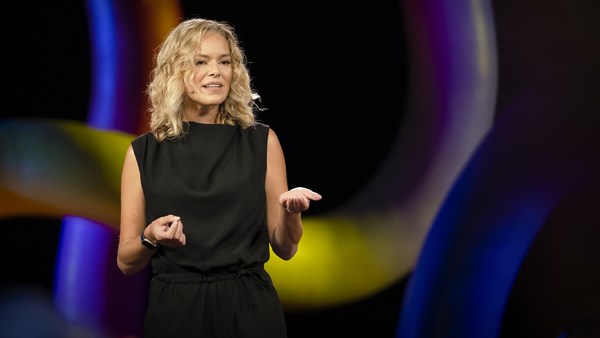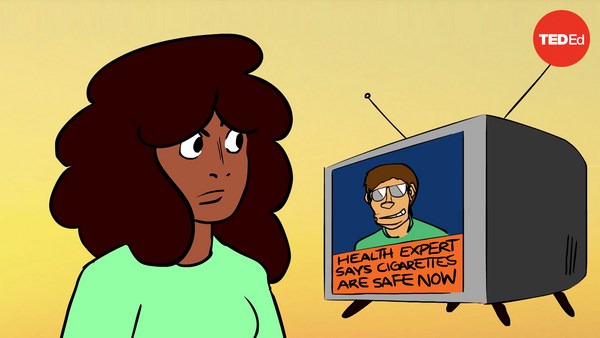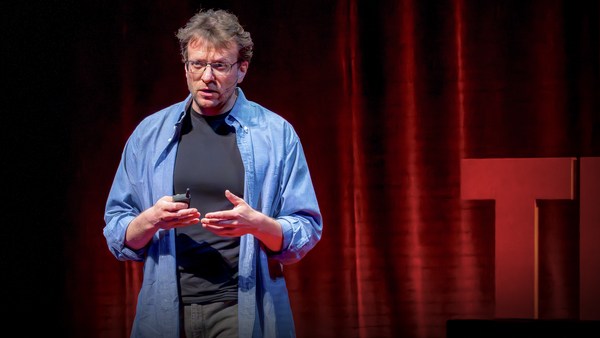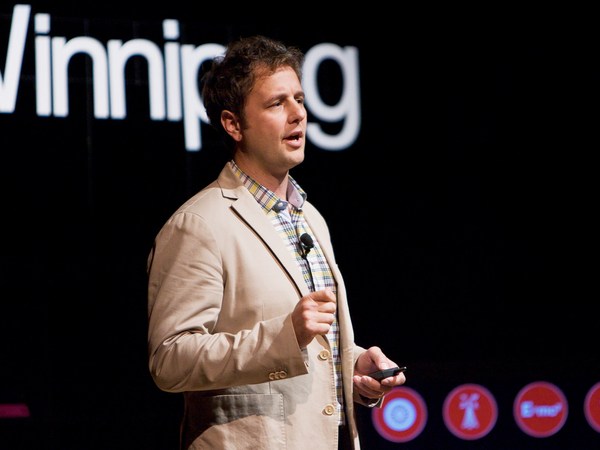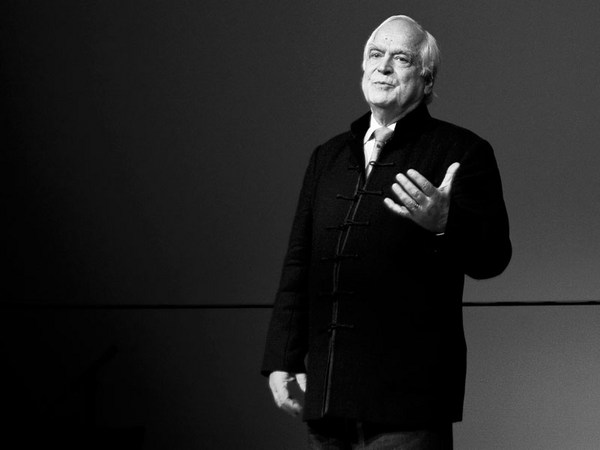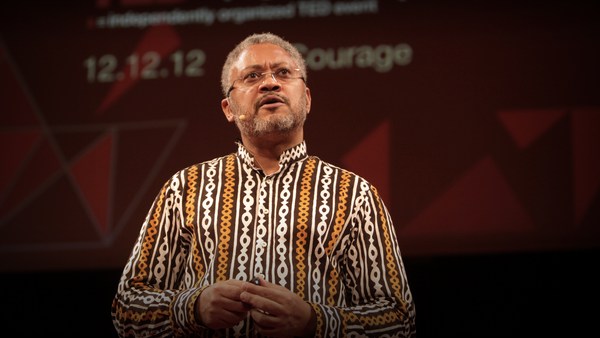I could not live without lying. I'm British.
(Laughter)
If you ask me how I am, I will always say, "I'm fine." I could have just stubbed my toe. I could have lost all my money on cryptocurrency.
(Laughter)
But don't worry, I'm fine. It's not just us. Absolutely no one on this planet could live without lying. Imagine telling the truth when your doctor asks you how much alcohol you drink.
(Laughter)
In a week, on average. I'll give you a figure, but it will be my weekend average. I told you, I'm British. We drink our alcohol in pint glasses. If you don't know what a pint glass is, it's the glass you can fit your fist into.
Lying is useful. It can keep us in denial of our responsibilities. It can help us avoid protracted conversations we don't want to have. Sometimes lying is the right thing to do. God forbid you should ever find me underneath the wheels of a bus. For goodness sake, do not tell me the truth. Tell me for a fact you know that I'm going to be okay.
(Laughter)
Don't accurately list all the bones in my body that are broken. Tell me that I am going to make it to watch the next "Avatar" movie.
(Laughter)
Give me hope. We tend to think of lying as something bad people do to manipulate us when they want us to believe something that isn't true. When most of the time for the day-to-day lies, it's just nice, ordinary people lying because in that moment it's easier than telling the truth. For example, "Oh, I'll be there in five minutes."
(Laughter)
When you haven't left the house yet, have you?
(Laughter)
Or, this is a good one, "I've read the terms and conditions."
(Laughter)
No one reads the terms and conditions. I've got a three-year-old and a five-year-old. Kids that age, I don't know why, they don't like to brush their teeth. So to get my kids to brush their teeth, I say, "Do you want me to throw your iPad in the bin? Do you want me to put it in the bin?" It's a lie, I'm not going to put their iPad in the bin. But there's two stereotypes about British people. One about the state of our teeth.
(Laughter)
And one about the state of our drinking, OK. I only want them to fall into one of those stereotypes.
(Laughter)
So I lie to get them to brush their teeth, and it works. And of course, it's a lie. I'm not going to put the iPad in the bin. No warranty will give me my money back because my kids are naughty. And it's my iPad.
I think the trick is, is to ask this question: am I lying for my good or for someone else's good?
I wrote a children's book about lies. I combed history for lies that are well established as untrue, because I wanted to find that line between the kind of lie we tell every day, and the kind of lie we'd like to distance ourselves from. The kind of lie that you might tell a bride when you say, "I love the bridesmaid dress you chose. It's just my color." It's hideous. But that's a good lie. It's not about you. It's about the bride, it's her day. She should have the dresses she wants. Or the kind of lie you tell to the elderly billionaire you're about to marry when you say you love them.
(Laughter)
That's a bad lie.
(Laughter)
You should not get married for money. You should get married for a Netflix password.
(Laughter)
I think it's the selfish lies we need to deal with, OK? The kind of lies that might make people money. The kind of lies that might harm others. The kind of lies that might win people votes. We need to get better at distinguishing between the acceptable lies and the unacceptable lies. And the way to do this is to get fib literate.
Want to be qualified in fibs? Ask yourself this question: when you're given the opportunity to lie, or when you've been given information and you're not sure it's true, ask yourself who will benefit.
Some examples. You get home late, you're tired. Your partner was supposed to put the bins out. They have not. Worse, they're going to go out and you're going to have to do the job yourself. And before they leave, they ask you, "Are you mad?" You're furious, you're incensed, but you say, "I'm not mad." That could be a good lie, OK. They can take the bins out next week. It's not a big deal. You're furious because you're tired. It's not a big deal, that's a good lie. Who benefits from that lie? Both of you in that relationship.
Another example. You've gone out with your friend, you've gone to the club. Your friend has driven. Whilst in the club, they've drunk five pints ... Of wine.
(Laughter) On the way out of the club, they say, "I'm good to drive. It's OK, it's a short drive. We barely have to do two right turns. It's not a problem, I'll get you home." That is a bad lie. Who's going to benefit from that lie? Nobody, that could harm others.
The key to fib literacy is to apply the question, “Who will benefit?” to any scenario. Take the mortgage crisis. Who benefited when lenders believed what the borrowers were telling them? Who benefited when everyone believed the lenders when they acted British and said, "Oh, we're fine. Nothing to see here." The lies were building up like dirty laundry until the stench became too bad to ignore.
Or take smoking. Who benefited when they lied about our ill health? They made smoking look so cool with their lies. Imagine that picture of Audrey Hepburn in that iconic picture from "Breakfast at Tiffany's" with a vape.
(Laughter)
We wouldn't change that cigarette for anything. But it was still a bad lie.
The act of lying is a necessity that we need to use, and it's an act of social grace. "Oh, I love that present you bought me. Thank you." "Your cooking tastes delicious."
We're actually very skillful in deceit. What we need to get more skillful in is determining the difference between the acceptable and unacceptable lie. We cannot vaccinate ourselves from lies. But by asking the question, “Who will benefit?” we can build resilience to deception.
I feel very bad to tell you all that we're all on the lying train. But the question is, are you going to get off on the good stop or the bad stop? You're right not to lie, that was a terrible analogy. It was terrible, I'm sorry. But you get what I mean.
And I'd like to take this moment to say this is an absolute honor. Thank you, TED, for giving me the greatest moment of my life.
(Cheers and applause)
No, no, no, sit down. Sit down, love, that was a lie.
(Laughter)
I'm sorry, it wasn't the greatest moment of my life. Do you want to know what the greatest moment of my life was or still is? Do you want to know what the greatest moment of my life is? Once, I got given a hotel breakfast for free.
(Laughter)
It was a pretty good moment. Pretty good moment. But this comes close.
Thank you.
(Applause)
